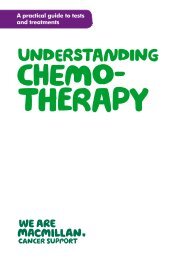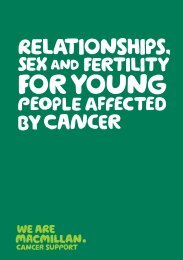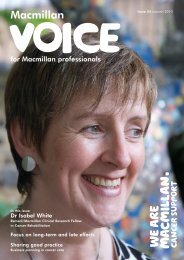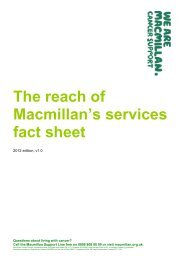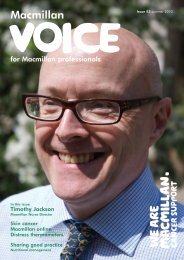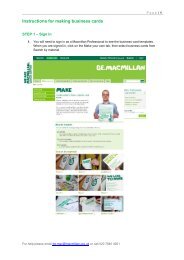Download PDF here - Macmillan Cancer Support
Download PDF here - Macmillan Cancer Support
Download PDF here - Macmillan Cancer Support
- No tags were found...
You also want an ePaper? Increase the reach of your titles
YUMPU automatically turns print PDFs into web optimized ePapers that Google loves.
Follow-up FeaturePiloting a nurse-ledsurvivorship clinic<strong>Macmillan</strong> Lead Gynae Oncology CNS Sarah Burton onsetting up a clinic for women affected by ovarian cancerLast year, my colleague ClareChurcher, Gynae Oncology CNSand I piloted a nurse-led survivorshipclinic for women with ovarian cancer at theVelindre <strong>Cancer</strong> Centre in Cardiff.Gynaecological referrals to the centrehave increased over the last five yearsand are expected to continue increasing.Based on this, and the fact that women withovarian cancer are living longer, we felt itwas necessary to deliver alternative followupcare. Women being cared for at thecentre also felt they couldn't take up theirconsultant's time with survivorship issues.Having previously run a nurse-ledchemotherapy clinic alongside doctors, webelieved we could apply a similar model,and that the nurse-led and consultant-ledservices would complement each other.Individual needsWe set up the survivorship clinic to discussindividual health needs and any associatedproblems. Common survivorship issuesfor ovarian cancer include psychosexualproblems, altered body image and fertilityissues. Some younger women experiencepost-menopausal symptoms following theirtreatment and say they do not feel feminineanymore. They can be tearful, have moodswings and loss of libido.Pilot clinicOur first clinic ran for three hours,with a 20 minutes slot for each patient.It became clear that 20 minutes was notenough, as each person took 30–45minutes to discuss their concerns in detail.We now allocate 30 minutes, which isadequate for most women, but we arelooking to review this. We also offertelephone follow-up.Many of the women attending the firstclinic had issues such as weight gain,exercise and diet, and concerns aboutfinances and employment rights. Wediscussed a variety of coping mechanisms.For many, it is about learning to live withtheir diagnosis and trying to live a ‘normal’life again.Women attending the clinic may havehad intensive treatment, involving visitsto the centre for clinic appointments andchemotherapy for 18 weeks or longer.To then be faced with being told, ‘we’llsee you in two to three months’ can bevery daunting. For some, facing life againwithout having the security of appointmentsat the centre is very frightening. Clare and Ioften find our patients need a lot of supportfollowing completion of their treatment. It’sall about adapting and tailoring the serviceto the individual.Positive evaluationA patient satisfaction questionnaire wassent out to 30 women in February and 25forms were returned. Responses showedthat patients were very satisfied withthe clinics. We also started a monthlypsychosexual treatment clinic for womenwith gynaecological cancers and somepeople living with colorectal cancers lastSeptember. We are looking to audit it soon.Further informationSarah Burton<strong>Macmillan</strong> Lead GynaeOncology Clinical NurseSpecialistVelindre <strong>Cancer</strong> Centre,Cardiffsarah.burton@wales.nhs.uk029 2061 5888’The nurses arealways happyto discuss anyproblems you have,Sarah inspiresconfidence’www.macmillan.org.uk/macvoice 15



